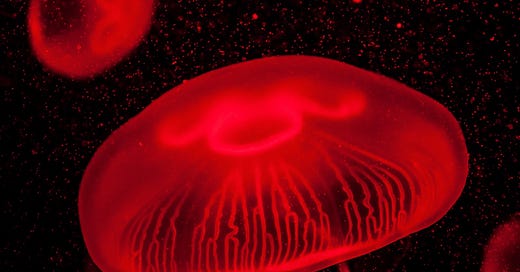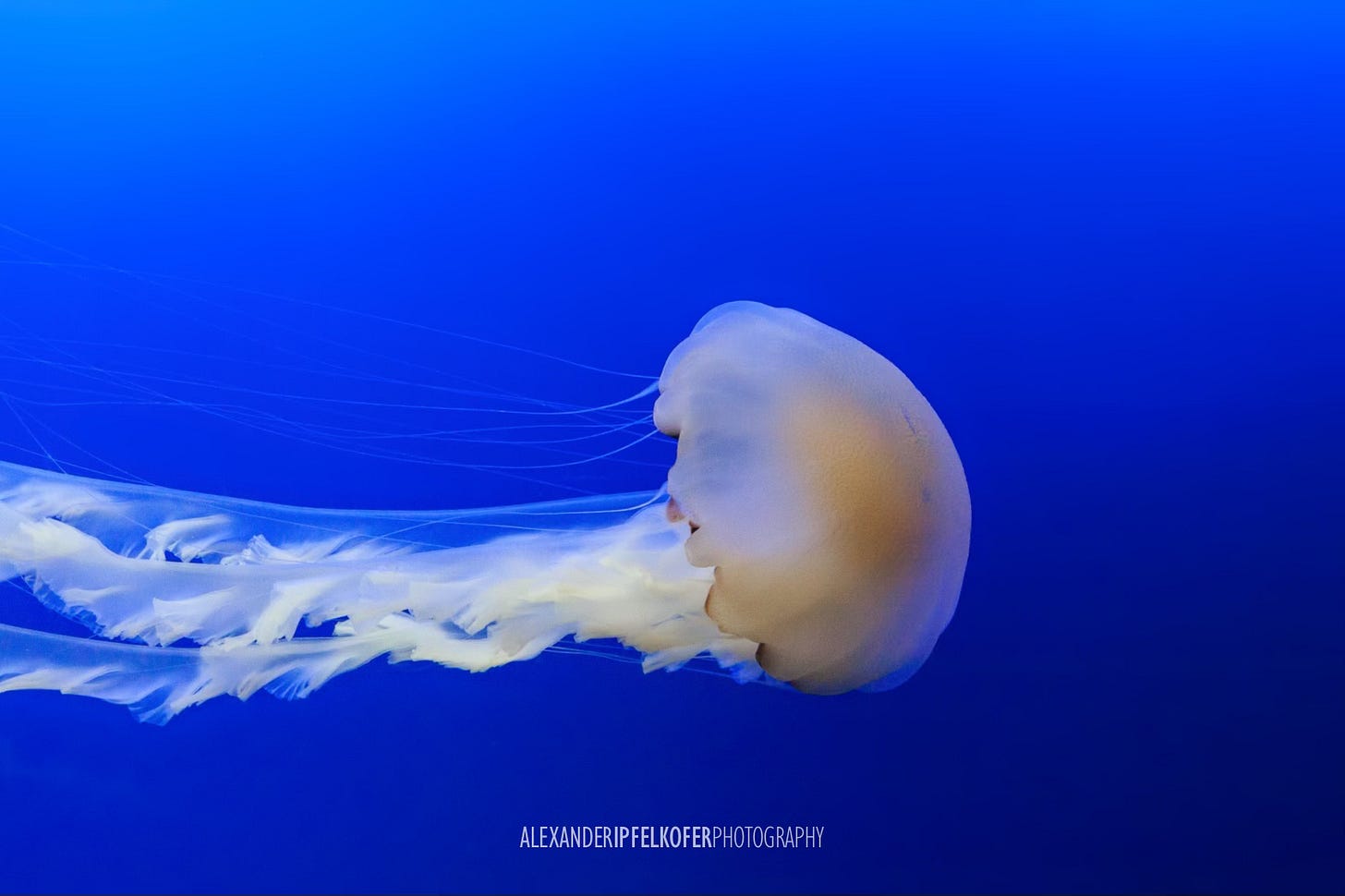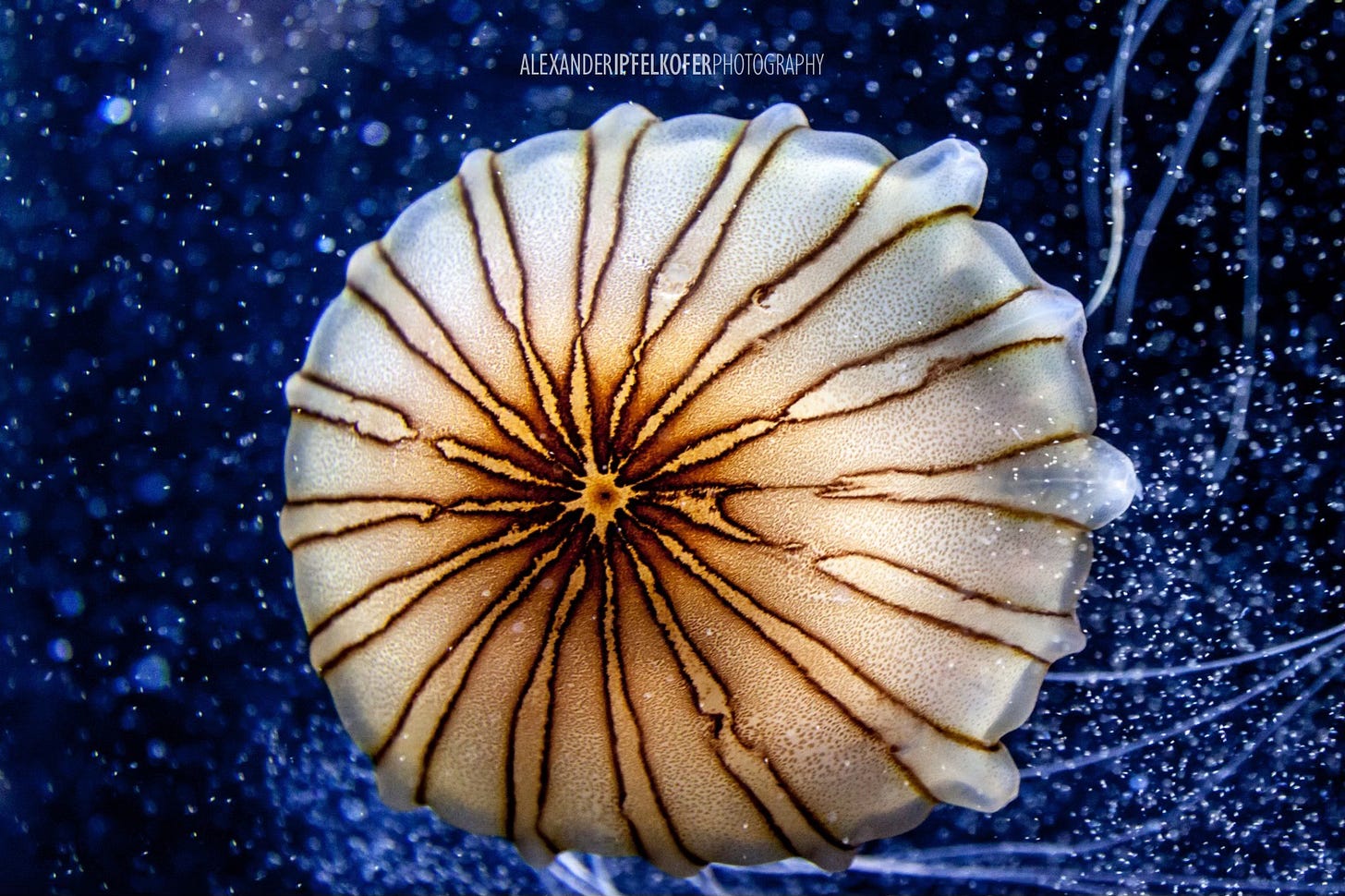I recently finished reading The Wind-Up Bird Chronicle (1994) by Haruki Murakami, which I liked. While this isn’t going to be a review or anything of the sort, choosing the images for this post, I was reminded of the main character and his fear of jellyfish and how the author handled this particular character flaw. Compared to Indy, who is afraid of snakes (due to a traumatic event from his childhood), more a source of comic relief, Toru’s fear is much more existential.
(Chapter 6) Toru Okada: “Although I said nothing to Kumiko, I actually hated jellyfish. I had often been stung by jellyfish while swimming in the ocean as a boy. Once, when swimming far out by myself, I wandered into a whole school of them. By the time I realized what I had done, I was surrounded. I never forgot the slimy, cold feeling of them touching me. In the center of that whirlpool of jellyfish, an immense terror overtook me, as if I had been dragged into a bottomless darkness. I wasn’t stung, for some reason, but in my panic I gulped a lot of ocean water. Which is why I would have liked to skip the jellyfish display if possible and go to see some ordinary fish, like tuna or flounder.”
The Wind-Up Bird Chronicle — Haruki Murakami
In contrast, his wife Kumiko thinks they are cute and looking at them, she realises that we only see a little part of the world.
Kumiko: “But one thing did occur to me when I was really focused on them. What we see before us is just one tiny part of the world. We get into the habit of thinking, This is the world, but that’s not true at all. The real world is in a much darker and deeper place than this, and most of it is occupied by jellyfish and things. We just happen to forget all that. Don’t you agree? Two-thirds of the earth’s surface is ocean, and all we can see of it with the naked eye is the surface: the skin. We hardly know anything about what’s underneath the skin.”
The Wind-Up Bird Chronicle — Haruki Murakami
What’s underneath? More jellyfish. Joking aside, it’s a great scene and it sticks with you, or at least it did with me. Have you read the book? What did you think of this scene?
In terms of character devices, Toru and Kumiko are contrasting characters (vs mirror characters), which makes their relationship complicated by default. What Toru realises is that the jellyfish, helped him get closer to his wife emotionally.
“When I saw it, I realized that I had managed to draw a little closer to her in the course of the day—thanks, no doubt, to the jellyfish.”
It’s a great book but not for everyone, should you decide to pick it up, there are some very intense descriptions within (not of jellyfish), which I am not going to spoil but just so you know.
Also, I found it interesting to read that the German version was at first translated from the English translation, talk about Lost In Translation…
The German translation by Giovanni and Ditte Bandini is based on the English translation, not on the Japanese original. Nearly 20 years after the first translation Ursula Gräfe translated the book from the Japanese original, including also the missing chapters. 'Die Chroniken des Aufziehvogels'. (Wikipedia)
Why did they change from singular to plural in the German title (Chronicles)? Even more interesting, the new German version includes the missing chapters, which for me would make it the definite version to read, unless one can read Japanese.
You may or may not know that Jay Rubin, the translator of the English version, had in fact translated everything and was urging the publisher to publish the whole book. Is that even a question? Yes. Unknown Japanese author, too long of a novel, will it sell for a Western audience? So the publisher decided to cut it (~ 61 pages/25k words) down to size. A brave Reddit user has translated the missing chapters and made them available here. I have not read it. If you have finished the book and read these missing chapters, I’d be interested if it changes anything for you. Which version do you prefer, abridged or unabridged? Do you have an example where the abridged version is better than the unabridged?
Meanwhile, here’s another jellyfish.
One might wonder, is it Toru’s fear of jellyfish itself, Scyphophobia, or the fear of getting seriously stung by one, which would be Cnidophobia? Maybe it’s both. It doesn’t matter, I’d say.
I’ll tell you a true story about jellyfish. It’s a tough one.
I remember, back in the summer of ‘84, we were vacationing in Rabac, former Yugoslavia at that time, and like today, they would sell these little fish nets to play with on the beach. It was a small beach, with ten or so families, most knew each other and were returning guests, every year, same place, same hotel, it was nice. There was this one new family, two kids, a brother around ten, I think, and a younger sister.
On that particular hot day, the tide had brought in clusters of jellyfish, the purple kind, they sting like hell. There were so many, you couldn’t dip a toe in without getting stung, but you could fish them out with those little nets. And that’s what the boy would do and then pour the content over his poor sister’s head, jellyfish would slither down her face, neck, chest, back, arms, hands and legs, they were everywhere.
I will never forget those screams. The girl survived, albeit, these kinds of burns can leave scars… not only the physical kind.
Fast forward, Italy 2019, my son and I are at the beach and he lifts something massive out of the water. A jellyfish. I panicked. Lucky him he held it on its head, where it doesn’t sting. He realised quickly I was not messing around when I shouted “Drop it!” He was fine. Lucky.
Here’s a compass jellyfish. You can look, but you better not touch.
Jellyfish as food? In Asian countries, jellyfish have been a source of food for thousands of years. They even sell it here in France at the local market across the street. I never tried. What about you? Eat jellyfish? In some cultures, it is known as an aphrodisiac.
Science looks at the immortal jellyfish in terms of their regenerative properties, cell renewal and rejuvenation. Do they hold the key to human longevity? The age-old quest: Immortality.
“The Turritopsis dohrnii jellyfish doesn’t die a natural death after it ages, but instead perpetually returns to infancy.”
I could finish with a song by Queen asking a certain question that ties into one of my favourite movies, where a French actor is cast as a Scot and a Scot is cast as a Spaniard. What a strange world. But I am not going to do that. Instead, since it was the summer of 1984, and since that song was on my mixtape, in my WM-6 walkman, which I had “modded” by painting it in a yellow/brown safari pattern — the hotel owner where we were staying liked it so much, he talked me into selling it to him for his daughter, but that’s another story — where was I? Ah, right. Time for a song.
Feel free to click the ❤️ button on this post and share it with a friend so more people can discover it on Substack. 🙏











These are stunning pictures, Alexander. Proper other worldly look to these amazing creatures. We see loads of jellyfish washed up on the beaches around here. My son was just as curious as yours when he was younger, but he gives them a wide berth now. The dog, not so much, and I need to keep chasing him away from them 🙄
The only Murakami I’ve ever read was “Kafka on the Shore” which I remember thinking was quite extraordinary
As for abridged and unabridged. Always the latter
Nice shout out on Highlander and a good wee tune as well 😁
Fantastic phototherapy 👏🏻👏🏻👏🏻